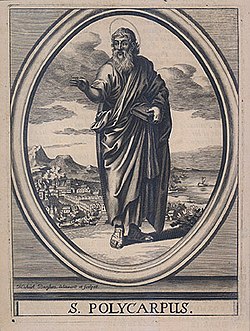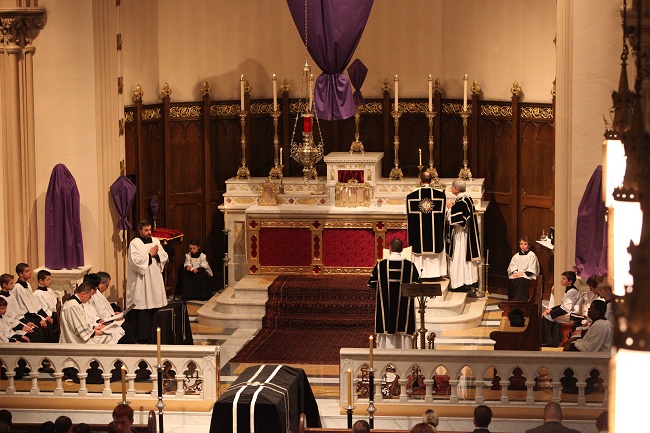Given the "proof text" approach of many Catholic apologists today, using the writings of the Apostolic and Church Fathers against protestants, only certain Fathers are read. St. Justin the Martyr is useful in "proving" the Eucharist. St. Ignatius of Antioch is useful in "proving" the idea of the Catholic Church. St. Cyprian is useful in "proving" the papacy. Yet what of great Fathers who are not so easily weaponized? Today they are forgotten by those who call nineteen century old writers to arms against Legion and his megachurches, but they are not forgotten by all. Some of us still find edification in the pastoral writings of the Fathers, as much so as in the doctrinal writings of other Fathers. One such Father who I find fascinating is St. Polycarp of Smyrna.
According to tradition Polycarp was taught by "St. John," who ordained him a bishop of the city of Smyrna. I put John in quotations because a few dispute whether his teacher was John the Apostle—writer of the Johannine Gospel, the first epistle of John, and the Apocalypse—or whether it was John the Presbyter—likely writer of the second and third epistles of John. Polycarp, who lived until the mid-second century, is remembered in his surviving letter to the Church at Philippi, where St. Paul "accurately and steadfastly taught the word of truth in the presence of whose who were then alive" (Ch. 3). The epistle is an exhortation to the laity and clergy to ignore the worldly temptations which have seduced some of the church and to return to the faith given to them by Paul and Ignatius. At some point Polycarp visited St. Anicetus, a fellow Syrian and at the time Pope of Rome. He fell asleep in the Lord in 155.
The epistle begins with a veritable Pauline greeting: "Polycarp, and the presbyters with him, to the Church of God sojourning at Philippi: Mercy to you, and peace from God Almighty, and from the Lord Jesus Christ, our Savior, be multiplied." The tone establishes that this missive has a personal connotation and not a formal one. He is acquainted with these believers and greets them in the spirit rather than in social respect.
The saint initiates the body of his letter with a reminder of that church's sufferings, "diadems of the true elect of God and our Lord." Mere works do not save, but faith. How is suffering not a "work?" Are the Christians of today to read Polycarp and surrender to the modern dichotomy between "faith" and "works?" This is not what the saint means: "[know] that by grace you are saved, not of work, but by the will of God" (Ch. 1) and "But He who raised [Jesus] up from the dead will raise up us also, if we do his will, and walk in His commandments, and love what He loved" (Ch. 2). One is saved by the will of God, not personal merit. Yet if one loves God one is united to the will of God and does what He wishes out of love for God—what we now call Sanctification or Theosis. This holiness in which one unites to the will of God is found in suffering, for Christ "suffered for own sins unto death" (Ch. 1) that "we might live in Him" (Ch. 8, 1 John 4:9). One does not suffer alone for Christ. The Christian suffers with Him as did the Apostles, who are "in their due place in the presence of the Lord, with whom also they suffered" (Ch. 9).
This same call to virtue displays ante-Nicene Trinitarianism. St. Polycarp establishes order and communion between "God" and the Son "Jesus Christ." The separation of the two persons of the Trinity as "God" and "Jesus" should not trouble us, as this terminology survives in the traditional Roman and the Byzantine liturgies, wherein God the Father is sparingly called "Father" directly, indeed perhaps only in the Our Father. "God" raised Jesus, glorified Him, sat Christ at His right hand, and gave Him the power of judgment; all these things are proper to the Godhead. Polycarp is using the ante-Nicene vocabulary for talking about the Divine inherited from the Jews which survives in the Church's liturgical life.
Chapter four opens with a famous aphorism, "But the love of money is the root of all evils." From here Polycarp gently indicts the priests, deacons, and laity of the church for losing their focus and then tries to re-direct this wayward church. What utility, the saint questions, is to be found in alternatives to virtue or the presentation of false virtue? God "clearly perceives all things, and that nothing is hid from Him, neither reasonings, nor reflections, nor any one of the secret things of the heart" (Ch. 4). God is not mocked, even in private. The saint gives a general warning against various kinds of that most powerful kinds of private sin, the sexual:
"For it is well that they should be cut off from the lusts that are in the world, since every lust wars against the spirit; and neither fornicators, nor effeminate, nor abusers of themselves with mankind [doesn't sound terribly fond of gay marriage] shall inherit the kingdom of God, nor those who do things inconsistent and unbecoming. Wherefore, it is needful to abstain from all these things, being subject to the presbyter and deacons, as unto God and Christ. The virgins also must walk in a blameless and pure conscience." (Ch. 5)
Sexuality is not necessarily a bad thing. Indeed it is quite good. The chastity outlined negatively above is one found in behaving according to one's place in life.
Perhaps priests would do well to read this letter particularly the sixth chapter, which outlines the saint's expectations of the presbyters and other clergy of the Church:
"Let the presbyters be compassionate and merciful to all, bringing back those that wander, visiting all the sick, and not neglecting the widow, the orphan, or the poor, but always providing for that which is becoming in the sight of God and man.... If then we entreat the Lord to forgive us, we ought also ourselves to forgive; for we are before the eyes of our Lord and God, and we must all appear at the judgment seat of Christ, and must every one give an account of himself. Let us then serve Him in fear, and with all reverence, even as He Himself has commanded us, and as did the apostles who preached the Gospel unto us, and the prophets who proclaimed beforehand the coming of the Lord."
In short, the priest is the fearful instrument of Christ God's mercy. The end.
Polycarp places the greatest emphasis of faith on the Resurrection and Last Judgement. Here is the strongest insight yet into how the early Church believed. Christ was the first fruit of His own work, a work from which we shall in time benefit or suffer from abusing. Reality in changed by this one event, the rising of a man—Who is God—from the dead. We are partakers in that Resurrection and will be held to account for it. Those who deny this are the "first born of Satan" (Ch. 7). Oh how does this concept of death survive for us today in the Requiem Mass of All Souls' Day! In the epistle of that Mass St. Paul warns the Corinthians that those who lived in Christ will come to the "resurrection of life," but that those who did evil will awake in the "resurrection of judgment." Death and judgment. Could any two topics be less popular? In my own family mention of either is tantamount to scandal.
After another exhortation to virtue St. Polycarp writes harsh words that should carry weight with every Catholic who sins in public, who dissents from the Church in public, and who does not practice virtue: "Be all of you subject one to another having your conduct blameless among the Gentiles, that you may both receive praise for your good works, and the Lord may not be blasphemed through you. But woe to him by whom the name of the Lord is blasphemed! Teach, therefore, sobriety to all, and manifest it also in your own conduct" (Ch. 10).
The author winds down his letter in lamentation, regretting the loss of the priest Valens and his wife to bad faith. Evidently they fell in matters of "covetousness." Polycarp finds the loss of the two particularly painful given St. Paul's praise for the church of Philippi. He begs the Philippians not to be too harsh on Valens and his wife: "And be then moderate in regard to this matter, and do not count such as enemies, but call them back as suffering and straying members, that you may save your whole body. For by so acting you shall edify yourselves" (Ch. 11).
The saint concludes in telling the Philippians that he is sending copies of St. Ignatius of Antioch's epistles with the messenger and even divulges the name of the scribe who wrote the letter, a man named Crescens, who will pay the Philippian Christians a visit with his sister! Personally I find the human elements of these letters calming, as I do in the Pauline epistles. Modern readers can read these ancient texts and think them remote, saccharine, or even impossible. These letters were written by and for people who, like we today, must run our course in the faith and do so with the same union to the will of God and the same humility to which Polycarp exhorted the church of Philippi.
Interesting Historical Notes
- Although a disciple of St. John, he rarely quotes John in this letter. The few times he does refer to John, such as in Chapter 8, are in reference to union with God—Theosis—indicating that this is a trait of the Johannine tradition. Also, in light of this, I would side with those who say Polycarp's John was the Evangelist and not the Presbyter.
- He is very familiar with most all of the Pauline letters and quotes them more than any other text considered Scripture. He especially favors Philippians, Galatians, Timothy, and Ephesians. This indicates that Paul's letters, which most now agree were written in the 50s, had been in wide circulation beyond the local churches for quite some time.
- Again, despite being from the Johannine tradition, Polycarp refers exclusively—at least in this sole surviving letter—to the Gospel according to St. Matthew and occasionally to St. Luke's account. These references are most often made to the Sermon on the Mount. The implications of this should be problematic to 20th century Biblical scholars who seek to drive a wedge between the Johannine tradition and the Synoptic texts. Evidently the bishop of Smyrna, a follower of John, saw no conflict or incongruity between the Synoptic narrative and the one he received. This could be explained by a theory that the account in St. John's Gospel draws to attention not a different Christ or different tradition, but different events and teachings not mentioned in the Synoptics. There is one Gospel and four accounts of it.
From this I think we must conclude that the New Testament texts were more broadly circulated and more widely accepted than we often realize.
Happy feast of the Invention of the Holy Cross!




